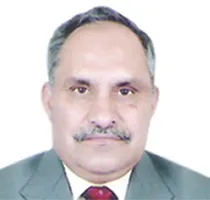Politics must have played a huge part in the 2005 Delhi blasts case investigation not being re-opened after new evidence came up. Why did neither the police nor the then government take cognizance? Was this because the Congress itself was a divided house?
It is not surprising that the verdict on the Delhi bombings of 2005 drew only a perfunctory response from the mainstream media. Activists of all varieties, nationalists, security pundits and the average citizen ignored the outcome or had little to say. Miscarriage of justice appears to have become the norm and draws little outrage, even from those most affected by its outcome. Their lack of response is understandable, given the fact that they are probably too traumatised and exhausted to fight back. Maybe, it is also our belief in karma and blind acceptance of whatever fate has in store that has made us so passive and lacking in initiative to fight for justice. Whatever, the outcome of this case has serious repercussions on our internal security situation.
On the evening of 29 October 2005, as shoppers were making final preparations for the upcoming festival of Diwali, Delhi was confronted with the horror of multiple bomb-blasts in the crowded streets of Sarojini Nagar Market, Paharganj and in a bus of the Delhi Transport Corporation. In the resulting mayhem, sixty seven people lost their lives and over 200 wounded. While the Pakistan-based Islamist terrorist organisation, the Islamic Revolutionary Front or Islamic Inquilab Mahaz, reportedly claimed responsibility for the attacks, it was then suspected that the level of sophistication of the timing devices and the use of RDX explosives pointed to one of the Pakistan based terrorist organisations, either the Jaish-e-Mohammed (JeM) or the Lashkar-e-Tayyeba (LeT), being involved. In a matter of weeks, Delhi Police, ATS, Special Branch, had arrested the alleged perpetrators of the attacks; the three Kashmiris arrested were allegedly operatives of the LeT — Tariq Ahmed Dar, Mohammad Rafique Shah and Mohammed Husain Fazili.
The chargesheet against them was finally filed in 2008, and if what Delhi Police stated at that time is to be believed, it had an open and shut case, and it was only a matter of time before justice would be served. While it may not have made any material difference to the circumstances that fate had thrust upon the victims and their kin, but at least a successful resolution of the case and appropriate punishment to the perpetrators would lead to some kind of closure. Alas, that was not to be, and twelve torturous years later, the ramshackle criminal justice system concluded that two of the alleged perpetrators were innocent due to lack of evidence, while the third, the alleged mastermind, Tariq Dar, was convicted of charges related to supporting terrorism but cleared of any role in the actual strike.
It now turns out that not only did the police not have any credible evidence to convict those arrested but also the case was so poorly investigated that reportedly some statements of witnesses were recorded as late as last year — a full eleven years after the event. Even more worrying, as per reports in the media, the Ministry of Home Affairs and intelligence and security agencies, including Andhra Pradesh Police, were fully aware, as early as 2009, of new evidence suggesting the attack had been carried out by Indian Mujahideen. This homegrown group was subsequently held responsible for a spate of bomb attacks between 2007 and 2009 at Delhi, Ahmedabad, Jaipur, Surat and Faizabad. Their chief bomb-maker, Atif Amin, suspected to have been responsible for this attack as well, was killed during the Batla House encounter.
Undoubtedly, politics must have played a huge part in the investigation not being re-opened after the new evidence had become available. Else, why would neither the police nor the Union Government take cognizance of the new facts? Was this because the Congress itself was a divided house over the matter of the Batla House encounter, as the actions of one of its most prominent leaders, Digvijaya Singh, show? He had been consistently alleging, even as late as May 2016, that the encounter was false and those killed or arrested were innocent. This, despite the fact that investigations by the National Human Rights Commission had cleared the police and the courts had convicted those arrested. In such circumstances, for the government to have changed its stance and held Atif Amin responsible for the 2005 bombings would have completely demolished Digvijaya Singh's and the liberal lobbies' argument. Thus, it may have been easier to let sleeping dogs lie and continue with the mockery of a trial.
So, who then are the real villains of the piece? That two young men from Kashmir could be arrested without a shred of credible evidence, makes a mockery of the professionalism that Delhi Police attempt to portray. The Investigating Officer and his team must bear a large part of the blame for the fiasco, but so must his superiors including the Police Commissioner who must have been aware of the investigation's progress. The functionaries in the Home Affairs Ministry, including the Minister and his deputy, who were unmoved by the new evidence in 2009, deserve to share a fairly large part of the blame for their inaction as well. It should not be difficult to trace all the villains responsible for this shoddy piece of police work. They deserve not just to be named and shamed but also face criminal action for their acts of omission and commission. One is left wondering as to what stopped the court from passing strictures against all those responsible for this miscarriage of justice as well as awarding compensation to those innocent men who have lost the best years of their lives, thanks to the shenanigans of these worthies. Incidentally, the Investigation Officer at that time — and this should come as no surprise — is reportedly the Deputy Commissioner, now heading the Anti-Terrorist Squad.
The larger issue that arises is of the impact of this state of affairs on our national security environment. Leave aside Delhi Police, whose credibility has never really been high; we cannot even trust the establishment responsible for ensuring a safe internal security environment to do its job without fear or favour. Why should we believe what the government says and what credibility do our law enforcement agencies have in front of other countries? While politicians of all hues, along with their friends and family, can ensure their personal security by utilising the tax-payers’ money for the services of the National Security Guards and other such organisations, once again, the common citizenry has been at the receiving end.
Finally, one cannot help but ask a question of our über patriots who are frothing at the mouth over the recent events at Delhi University: Why has this government not taken heed of what transpired in the Delhi bomb blast case? Is it also complicit like the Congress or does it find it easier to terrorise a 20-year old student and organise flag marches rather than to deal with the actual business of making the country safe?
This commentary originally appeared in The Pioneer.
The views expressed above belong to the author(s). ORF research and analyses now available on Telegram! Click here to access our curated content — blogs, longforms and interviews.




 PREV
PREV


